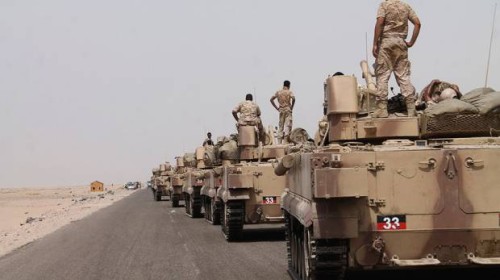PHOTO: UAE forces move towards a base in southern Yemen in early August (AP)
Much attention has been devoted to the Saudi intervention in Yemen’s civil war, with Riyadh organizing a coalition in March for airstrikes against the Ansar Allah (Houthi) movement which controls the capital Sana’a and most of the country.
Less known is the role of the United Arab Emirates. The UAE has sent in ground troops, pushing back the Ansar Allah advance on the port city of Aden — where an alternative Government is in place — and recapturing parts of the south.
Yaroslav Trofimov reports for the Wall Street Journal:
At checkpoints across this war-racked city in southern Yemen, local fighters wearing flip-flops and carrying Kalashnikov rifles fly the flag of the United Arab Emirates.
Some of the men fighting the pro-Iranian Houthi militia have taken to wearing soccer jerseys with the Emirates Airline logo, instead of uniforms. Civilians often drape U.A.E. flags over the hoods of their cars as they navigate past bombed-out high-rises and the charred hulks of tanks that were part of the Houthi rebel force that recently occupied the city.
Fewer than a hundred U.A.E. troops and their unmarked armored vehicles landed in a small fishing harbor on the outskirts of Aden in July, according to Emirati officers who participated in the operation. This secretive intervention prevented the Houthis from overrunning this port city, which had a prewar population of 1.5 million.
Thousands of additional U.A.E. troops, with their fleet of tanks and Apache combat helicopters, arrived in the weeks that followed. They have since pushed the Houthis out of the city and seized most of the two neighboring provinces.
The ground operation, which Saudi Arabia has joined, is the biggest by Sunni Arab states against the growing influence of Shiite Iran since the Arab Spring began.
For the U.A.E., a wealthy but small Gulf monarchy whose capital is 1,000 miles away, this intervention is also by far its most ambitious foreign venture.
Emirati officials argue that allowing the Houthis to take over Yemen would have created a hostile Iranian proxy state on Saudi Arabia’s doorstep, one that could threaten the existence of the Gulf monarchies. Iran has denied its military is supporting the Houthis.
The Emiratis and their local allies now are pressing the offensive into the mountain ranges that separate southern Yemen, where many favor a return to one-time independence, from the country’s north, where the Houthis enjoy a much higher degree of support.
Most of southern Yemen follows the Shafii branch of Sunni Islam. In the north, the Shiite Zaidi sect to which the Houthis belong is widespread.
With the government of President Abed Rabbo Mansour Hadi exiled in the Saudi capital of Riyadh, the U.A.E. forces in Aden now find themselves in the business of nation-building—much as the U.S. tried to do in Iraq after ousting Saddam Hussein, and in Afghanistan after the fall of the Taliban.

